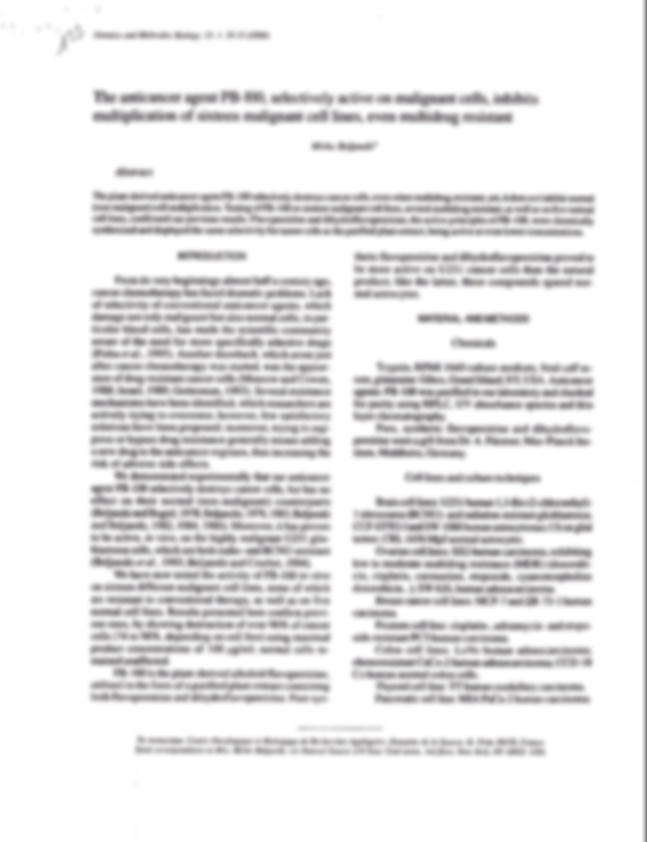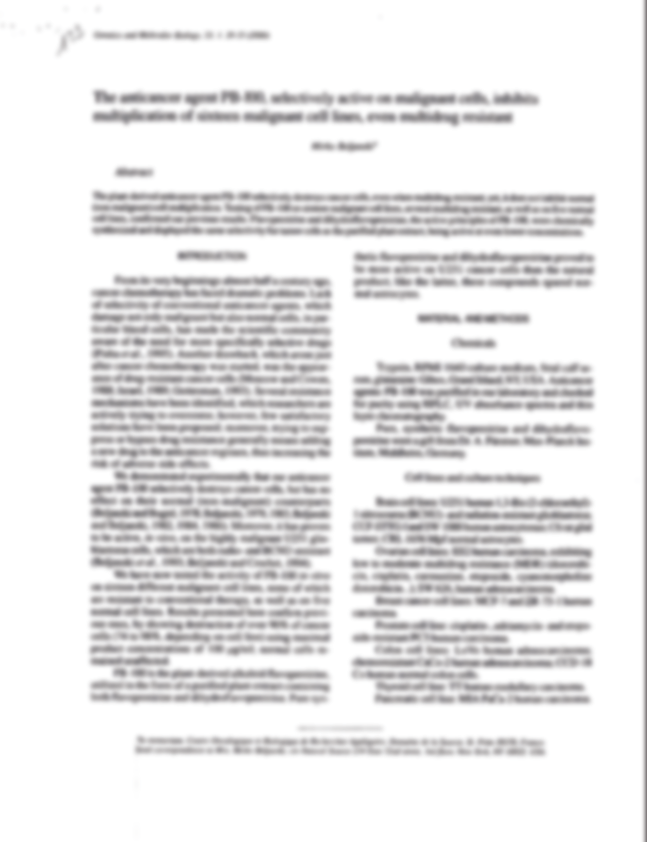Publications de Mirko Beljanski
103 – Activation et inactivation des gènes: Incidence en cancérologie
Aspect de la recherche. Université Paris-Sud, 1985, pp. 56-62
Document not available online
Document not available online
102 – The in vitro Effects of Opines and Other Compounds on DNAs Originating from Bacteria and from Healthy and Tumorous Plant Tissues
Expl. Cell. Biol., 53, 1985, pp. 335-350.
Available in English only
ABSTRACT: Purified total DNAs were isolated from oncogenic or nononcogenic Agrobacterium tumefaciens cells as well as from normal and crown gall tissues. Opines (octopine, nopaline, lysopine), plant hormone (auxin IAA) and some carcinogenic compounds were used in order to correlate their effects on in vitro strand separation and synthesis of DNAs with in vivo tumorous cell multiplication. Octopine (or nopaline) induced chain opening of DNAs originating from octopine (or nopaline)-metabolizing bacteria and from same bacteria strain-induced tumorous cells. This phenomenon was measured by the increase in DNA hyperchromicity which is concentration dependent. The tested compounds stimulated the in vitro synthesis of the same DNAs. Under the same conditions, in vitro strand separation and synthesis of healthy plant DNA was not (or only slightly) enhanced, except in the case of particular hormone-connected healthy cell DNA. IAA and carcinogens stimulated in vitro synthesis and induced in vitro strand separation (dose-dependent effect) of DNAs isolated from crown gall cells and inducing bacteria. Compared to healthy cell DNAs, these DNAs were thus susceptible to structurally very diversified molecules and in this way behave as do mammalian tissue DNAs. The opine and IAA actions observed here were specific for plant tissue DNA; cancerous human or animal tissue DNAs were insensitive. By their presence in the crown gall cells, opines possibly maintain destabilized areas (required for rapid growth and division) on tumor cell DNA. The cooperative actions of IAA and opines as well as small RNA and RNA fragments on gene activation, might explain the autonomy of plant tumor cells..
ABSTRACT: Purified total DNAs were isolated from oncogenic or nononcogenic Agrobacterium tumefaciens cells as well as from normal and crown gall tissues. Opines (octopine, nopaline, lysopine), plant hormone (auxin IAA) and some carcinogenic compounds were used in order to correlate their effects on in vitro strand separation and synthesis of DNAs with in vivo tumorous cell multiplication. Octopine (or nopaline) induced chain opening of DNAs originating from octopine (or nopaline)-metabolizing bacteria and from same bacteria strain-induced tumorous cells. This phenomenon was measured by the increase in DNA hyperchromicity which is concentration dependent. The tested compounds stimulated the in vitro synthesis of the same DNAs. Under the same conditions, in vitro strand separation and synthesis of healthy plant DNA was not (or only slightly) enhanced, except in the case of particular hormone-connected healthy cell DNA. IAA and carcinogens stimulated in vitro synthesis and induced in vitro strand separation (dose-dependent effect) of DNAs isolated from crown gall cells and inducing bacteria. Compared to healthy cell DNAs, these DNAs were thus susceptible to structurally very diversified molecules and in this way behave as do mammalian tissue DNAs. The opine and IAA actions observed here were specific for plant tissue DNA; cancerous human or animal tissue DNAs were insensitive. By their presence in the crown gall cells, opines possibly maintain destabilized areas (required for rapid growth and division) on tumor cell DNA. The cooperative actions of IAA and opines as well as small RNA and RNA fragments on gene activation, might explain the autonomy of plant tumor cells..
101 – Growth inhibition of crown-gall tissues in relation to the struture and activity of DNA
Physiol. Plant., 64, 1985, pp. 177-184.
Available in English only
ABSTRACT: The growth of Crown-gall cells cultures in vitro (Nicotiana tabacum L. cv. White Burley and Parthenocissus tricuspidata cv. Veitchii) is inhibited by alstonine (BG-8), a plant alkaloid, the anti-cancer effect of which has previously been demonstrated on animals and plants. The growth of normal cells is only slightly affected. The inhibitory effect of BG-8 on crown-gall cells is antagonized byindole-3-ecatic acid (IAA) added to the culture medium. Kinetin associated with IAA does not prevent this inhibitory effect. BG-8 present in the culture medium containing the two types of hormones seems to modify the later hormonal requirement of Parthenocissus crown-gall tissues…
ABSTRACT: The growth of Crown-gall cells cultures in vitro (Nicotiana tabacum L. cv. White Burley and Parthenocissus tricuspidata cv. Veitchii) is inhibited by alstonine (BG-8), a plant alkaloid, the anti-cancer effect of which has previously been demonstrated on animals and plants. The growth of normal cells is only slightly affected. The inhibitory effect of BG-8 on crown-gall cells is antagonized byindole-3-ecatic acid (IAA) added to the culture medium. Kinetin associated with IAA does not prevent this inhibitory effect. BG-8 present in the culture medium containing the two types of hormones seems to modify the later hormonal requirement of Parthenocissus crown-gall tissues…
100 – Three alkaloids as selective destroyers of the proliferative capacity of cancer cells
IRCS Med. Sci., 12, 1984, pp. 587-588
Available in English only
ABSTRACT: Most of the anti-cancer drugs at present used in cancer chemotherapy exhibit tissue toxicity and cause severe damage to harmatopoietic cells. In addition, they are mutagenic and/or carcinogenic in animals and in plants. Using the Oncotest, we have selected three alkaloïds, alstonine, serpentine and sempervirine that possess the capacity to sistinguish in vitro between DNAs isolated from cancerous and healthy mammalian and plant tissues. They bind to the initiation sites of destabilized cancer DNA synthesis, without affecting that of DNAs from healthy tissues. Here we demonstrate that each of the three alkaloïds, which remain inactive against normal eukaryotic cells, selectively and completely destroys the proliferative potential of various established cancer cell lines maintained in and in vitro culture.
ABSTRACT: Most of the anti-cancer drugs at present used in cancer chemotherapy exhibit tissue toxicity and cause severe damage to harmatopoietic cells. In addition, they are mutagenic and/or carcinogenic in animals and in plants. Using the Oncotest, we have selected three alkaloïds, alstonine, serpentine and sempervirine that possess the capacity to sistinguish in vitro between DNAs isolated from cancerous and healthy mammalian and plant tissues. They bind to the initiation sites of destabilized cancer DNA synthesis, without affecting that of DNAs from healthy tissues. Here we demonstrate that each of the three alkaloïds, which remain inactive against normal eukaryotic cells, selectively and completely destroys the proliferative potential of various established cancer cell lines maintained in and in vitro culture.
99 – The Regulation of DNA Replication and Transcription. The Role of Trigger Molecules in Normal and Malignant Gene Expression
Experimental Biology and Medicine, vol.8, Karger (1983), pp. 1-190.
Available in English only
ABSTRACT: This monograph explores basic processes of DNA replication and transcription in an effort to identify the mechanisms responsible for the release of genetic information and its role in the regulation of cellular events.
ABSTRACT: This monograph explores basic processes of DNA replication and transcription in an effort to identify the mechanisms responsible for the release of genetic information and its role in the regulation of cellular events.
98 – Leucocyte Recovery With Short-Chain RNA Fragments in Cyclophosphamide-Treated Rabbits
Ce document n'est pas disponible en ligne.
Document not available online
97 – Tumor promoter (TPA), DNA chain opening and unscheduled DNA synthesis
IRCS Med. Sci., 11, 1983, pp. 363-364.
Available in English only
ABSTRACT: Tumor promoters accelerate the proliferative capacity of tumor cells although at high concentrations they may induce carcinogenesis in animals. Recently it was shown that TPA, (12-0)trtradecanoyl-phorbol-13-acetate), the tumor promoting phorbol ester, appears to act in a similar fashion on normal embryonal diploid and cancer cells. TPA induces differentiation of leukemic cells, activetes silent genes for specific r-RNA synthesis in hybrid cells and promotes cell proliferative capacity or phenotypic cellular changes. Here we report the in vitro effect of TPA on DNA secondary structure and DNA in vitro synthesis.
ABSTRACT: Tumor promoters accelerate the proliferative capacity of tumor cells although at high concentrations they may induce carcinogenesis in animals. Recently it was shown that TPA, (12-0)trtradecanoyl-phorbol-13-acetate), the tumor promoting phorbol ester, appears to act in a similar fashion on normal embryonal diploid and cancer cells. TPA induces differentiation of leukemic cells, activetes silent genes for specific r-RNA synthesis in hybrid cells and promotes cell proliferative capacity or phenotypic cellular changes. Here we report the in vitro effect of TPA on DNA secondary structure and DNA in vitro synthesis.
Document not available online
95 – Oncotest: dépistage des potentiels cancérogènes et spécifiquement anti-cancéreux. Conceptions et perspectives nouvelles en cancérologie
Environnement et nouvelle médecine. n°2, 1982, pp. 18-23.
Document not available online
Document not available online
94 – Preventive and curative anticancer drug. Application to Crown-gall tumors
Acta Horticulturae, n°125, 1982, pp. 239-248.
Document not available online
Document not available online





